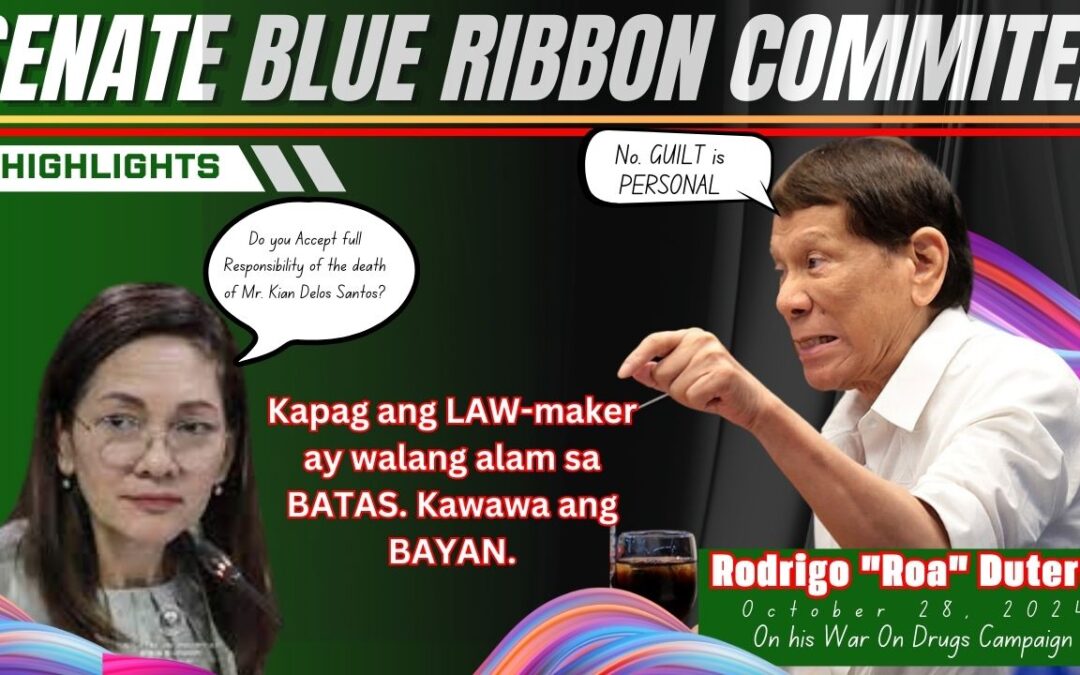During the Senate Blue Ribbon Committee hearing on October 28, 2024, former President Rodrigo “Roa” Duterte was invited as a resource person to discuss and provide clarity on his administration’s controversial war on drugs. This program, which dominated his presidential term, has been a focal point of national and international attention due to alleged human rights violations and the deaths of several individuals, including minors like Kian de los Santos. The hearing aimed to revisit and scrutinize the policies, methods, and accountability measures of Duterte’s anti-drug campaign. His presence at the committee was highly anticipated as various senators sought to understand the depth of responsibility he was willing to acknowledge.
One of the most compelling moments of the hearing was when Senator Risa Hontiveros posed a pointed question to Duterte regarding his role and potential culpability in the death of Kian de los Santos, a teenager whose killing during a police operation had sparked widespread outrage. Senator Hontiveros, known for her advocacy on human rights, was assertive and unwavering in her demand for a direct answer from the former president. She sought to hear him explicitly accept full responsibility for the actions taken during his administration’s drug war. However, instead of providing an immediate response, Duterte requested a brief recess. This pause raised questions and speculation about whether he was trying to avoid the question or if he had strategic reasons for taking a moment before responding.
The brief adjournment and Duterte’s return to the session brought an air of tension and anticipation. When the session resumed, Senator Hontiveros reiterated her question, maintaining her composed but insistent tone. Duterte, in his response, emphasized a legal principle that resonated through the session: “Guilt is personal.” This statement shifted the focus from direct accountability to a broader discussion of criminal liability within the Philippine legal system. Observers and analysts speculated on whether his invocation of this legal concept was a refusal to accept collective or implied responsibility for state actions or an attempt to educate and clarify the nuances of legal culpability.
In the context of Philippine law, the principle that “guilt is personal” is fundamental. It means that criminal responsibility is individual and cannot be ascribed to others who did not partake in or contribute to the commission of a crime. This legal doctrine emphasizes that only those who directly committed the act, aided, abetted, or conspired in carrying out the offense can be held criminally liable. The principle underscores the constitutional guarantee that every accused is presumed innocent until proven guilty and that only through due process can one be convicted of a crime. Duterte’s assertion implied that unless evidence proved individual involvement, liability could not be imposed based on association or office held.
The statement made by Duterte, “Guilt is personal,” was not only a reflection of his stance on the matter but also a reference to a longstanding judicial standard in the Philippine legal system. This concept protects individuals from unjust persecution or being charged with a crime by mere association with the actual perpetrators. It aligns with the constitutional rights outlined under Article III of the 1987 Philippine Constitution, particularly the right to due process and protection against collective blame. Duterte’s response suggested that any examination of liability in the war on drugs must follow due legal procedures, ensuring that responsibility is assigned only when a person’s direct involvement is established beyond reasonable doubt.

